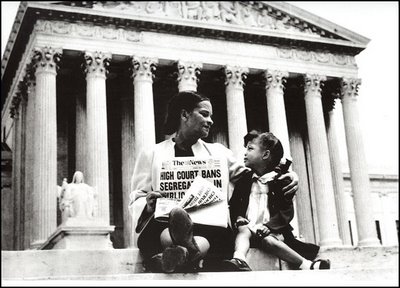
As I the read the following article I was quick to assume the student mentioned just didn't want to take the test. (Actually I read it while meeting with several other social studies teachers yesterday after school) We all originally thought this was some sort of "sour grapes" over a poor regents exam grade. However upon a further reading of the brief article we were impressed that the student not only passed the regents exam, but also answered the questions correctly that she perceived as inappropriate.
This student knows how to play the game and is not afraid to stand up for what she believes. I admire her actions. We could all learn a valuable lesson from her.
On the anniversary of Brown v Board of Ed I thought this would be appropriate to share our thoughts around the following article.
The article reads as follows:
Testing boundaries
By ERIN EINHORNDAILY NEWS STAFF WRITER
Monday, May 15th, 2006 Black students and educators are denouncing a series of questions on the most recent global history Regents exam that they charge were racially biased and insensitive.
At least one student - Chantelle Jones, a junior at Bushwick Community High School in Brooklyn - said she was so outraged by the questions on the January test, she complained to the exam proctor.
She then ran out of time on the test's final essay, never finished it, and failed. She'll have to take the required test again in June.
"It makes me so upset," said Jones, 18. "It's disrespectful to me and my people."
The questions - which asked students to describe how Africa benefited from imperialism - were on a section of the exam that gave students historical passages to read, then asked them to describe the arguments made by the author.
The first was based on an 1893 passage from "The Rise of Our East African Empire," by Frederick Lugard, who, while working for the Imperial British East Africa Co. in the 19th century, helped colonize Uganda and other African countries.
On the exam, students were asked to read Lugard's account of British projects in Africa like digging wells and building irrigation systems, then to "state two ways British imperialism would benefit Africans."
Next up was a passage from Lugard's "The Dual Mandate in British Tropical Africa," from 1922. It described British efforts to end the slave trade and reduce famine and disease.
"We are endeavoring ... to teach the native races to conduct their own affairs with justice and humanity, and to educate them alike in letters and in industry," Lugard wrote.
Students were asked to name "two ways the British improved the lives of Africans."
"This is just beyond the pale," said Esmeralda Simmons, the executive director of the Center for Law and Social Justice at Medgar Evers College.
"It's basically asking students of African descent, and all students, to justify European or British imperialism as if Africans were either culturally or genetically inferior," added Simmons, who sent a formal letter of protest to the Regents.
Tom Dunn, a spokesman for the state Education Department, noted that the test was put together by educators of "diverse backgrounds."
But he added the Lugard portion of the exam "should have been worded in a way that clearly instructed students to respond based on the perspective of the author."
Still, he said, "In order to teach history, we have to use passages that reflect history's reality. ... Kids have to learn the skills of historical analysis, which includes the ability to investigate different and competing interpretations of the theories of history."
But that argument doesn't fly with Brian Favors, who teaches a course on slavery and counts Jones among his students.
He called the questions, "very racist," adding: "It's the equivalent of asking a Jewish child to state two ways the Holocaust benefited Jews."
Favors is a member of Black New Yorkers for Educational Excellence, which is sponsoring a rally to "end institutional racism" on Wednesday - the 52nd anniversary of the landmark Brown vs. Board of Education Supreme Court decision. The rally will be at the city Education Department.
Simmons said she wants to see the Regents void students' answers on the controversial questions.
That wouldn't help Jones, though - she said she answered those questions correctly.
"I picked something out of all those lies and put it down," she said. "I was kind of sarcastic with my answer. I let it be known to whoever was grading the exam that I was upset, but I had to pass the exam."
Tuesday, May 16, 2006
Regents Exam Forgot 1954
Posted by
W Brown
at
7:57 AM
![]()
Subscribe to:
Post Comments (Atom)




No comments:
Post a Comment